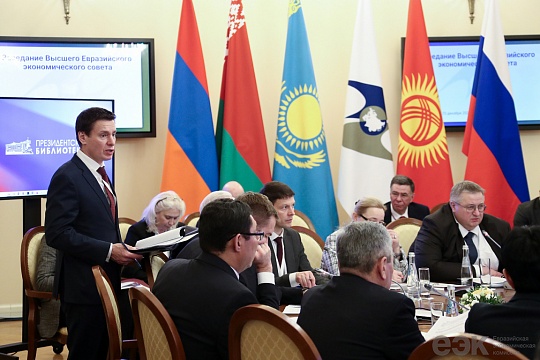The Future of the Eurasian Economic Union
Moscow is pushing to extend the free trade area created in 2014 with Belarus and Kazakhstan and already extended to Armenia and Kyrgyzstan to all non-hostile former Soviet countries. But the Eurasian countries are gaining big economic benefits from geopolitical tensions. With the oil sector, in particular, now poised between traditional routes and new prospects of collaboration with Westerners.
Moscow (AsiaNews) - Russia is trying to expand participation in the Eurasian Economic Union (EAES), as a "strategic priority" that intends to involve all ex-Soviet countries not explicitly aligned against Moscow.
In addition to the two founders together with Russia in 2014 (Belarus and Kazakhstan) and the associated Armenia and Kyrgyzstan, they would also like to definitively aggregate the "observers" which are currently Cuba, Uzbekistan, Tajikistan and Moldova, the latter actually about to leave , unless a new "special operation" takes place to bring it back to the parent company.
Furthermore, they would also like to attract Vietnam, Singapore and Serbia as well as Turkmenistan and Mongolia, or even Afghanistan, increasingly into the Kremlin's good graces.
In March some Eaes representatives met with Indian officials, proposing to New Delhi the formation of a free trade zone, which the Russians could exploit as one of the ways to circumvent the sanctions.
The member countries, despite fluctuating tensions such as those between Moscow and Yerevan, are obtaining great economic advantages with the supplies of items subjected to sanctions in Russia and Belarus, even if in words they try to show loyalty to the international sanctions regime, as is repeated every week in statements from Akorda, the Kazakh presidential palace.
In fact, in addition to punitive measures from outside, in Kazakhstan there is fear of internal reactions, increasingly contrary to the role of vassal of the Kremlin, which the Astana government is unable to shake off.
Tajikistan does not seem willing to take the decisive step to join the Union as a full member, especially following the strong tensions following the attack on the Krokus City Hall, which is putting the entire Tajik community of migrant workers in Russia in crisis.
Russian investments in these countries, moreover, are becoming increasingly complicated not only due to sanctions, but also due to the lack of qualified personnel, among those mobilized and emigrants abroad.
In particular, the oil sector finds itself in balance between traditional routes and new prospects for collaboration with Westerners. The Russians barely manage to create defensive barriers, such as the disinformation recently spread by Moscow on the leaks of the Caspian gas pipeline, to prevent the Italian company Eni and other partners from accessing the production of the Kazakh wells of Kashagan.
The North Caspian Operating Company, active in the area, denied the rumors about the dispersion of the oil, releasing videos that confirm the integrity of the wells, in which no spots of lost oil can be seen. Astana's energy minister, Almasadam Satkaliev, also assured that there are no losses in the area.
A further problem in the internal relations of the Eaes is the recent arrest of the former Kazakh economy minister, Kuandyk Bišimbaev, accused of savagely killing his wife Saltanat Nukenova, for whom solidarity demonstrations are being held all over the world.
The trial appears as a serious stain on the attempt of the president, Kasym-Žomart Tokaev, to present the "new Kazakhstan" as a society free from corruption and abuse of power, the accused being one of the most representative men of the old ruling caste , just as Astana is trying to distance itself from any shadow of the Soviet past.
Eurasia remains more than ever suspended between the past closely linked to Russia, and the future of new relations between states open to internal democracy and international relations free from constraints, while new forms of repression of freedom of expression and of information.
Trade and the economy depend today more than ever on the basic political choices of these countries, and the link with Russia does not help to support positive changes for a more stable and prosperous future on the part of local governments.







.png)











